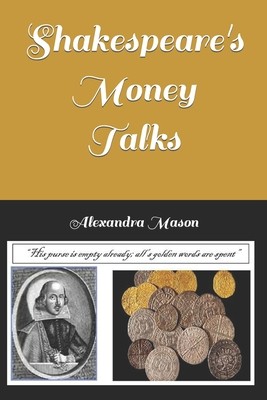
- We will send in 10–14 business days.
- Author: Alexandra Mason
- Publisher: Turnstone Books of Oregon
- ISBN-10: 1737395800
- ISBN-13: 9781737395805
- Format: 15.2 x 22.9 x 1.5 cm, minkšti viršeliai
- Language: English
- SAVE -10% with code: EXTRA
Reviews
Description
In this long-awaited revised and expanded second edition of "Econolingua," now entitled "Shakespeare's Money Talks," Alexandra Mason, Ph.D., offers an easily-accessible classic reference work to all lovers of Shakespeare and his dramatic times: scholars, actors and directors, teachers and students, readers and re-readers, and aficionados of history, culture, and society. Shakespeare's world--and his characters--come to life in this study of metaphor as they self-consciously test the limits of words and their exchange function in establishing social hierarchy, social status and value. Renaissance drama is revealed as a dynamic marketplace of exchange and assessment in which characters discover and test their relational worth. Each glossed term conveniently gives the phrase of its usage in the entry, both the literal and the metaphorical for full illumination. Introductory and supplemental essays catalogue dramatic usage of econolingua (terms related to coins, money, and value) and discuss "Usury and the Right Uses of Wealth" and "Shakespeare's Economics," the impact of a changing system of social value on the structures of his plays.
The study has been compared in scope and significance to Eric Partridge's classic "Shakespeare's Bawdy." Critics have high praise for the continued relevance of Mason's work, which set the standard for an entire school of economic studies of Shakespeare and his times. This is a volume to be treasured, and consulted regularly. It is itself a treasury of knowledge that leads us to appreciate the dramatic artistry of Shakespeare and his contemporaries ever more profoundly.
EXTRA 10 % discount with code: EXTRA
The promotion ends in 21d.03:43:28
The discount code is valid when purchasing from 10 €. Discounts do not stack.
- Author: Alexandra Mason
- Publisher: Turnstone Books of Oregon
- ISBN-10: 1737395800
- ISBN-13: 9781737395805
- Format: 15.2 x 22.9 x 1.5 cm, minkšti viršeliai
- Language: English English
In this long-awaited revised and expanded second edition of "Econolingua," now entitled "Shakespeare's Money Talks," Alexandra Mason, Ph.D., offers an easily-accessible classic reference work to all lovers of Shakespeare and his dramatic times: scholars, actors and directors, teachers and students, readers and re-readers, and aficionados of history, culture, and society. Shakespeare's world--and his characters--come to life in this study of metaphor as they self-consciously test the limits of words and their exchange function in establishing social hierarchy, social status and value. Renaissance drama is revealed as a dynamic marketplace of exchange and assessment in which characters discover and test their relational worth. Each glossed term conveniently gives the phrase of its usage in the entry, both the literal and the metaphorical for full illumination. Introductory and supplemental essays catalogue dramatic usage of econolingua (terms related to coins, money, and value) and discuss "Usury and the Right Uses of Wealth" and "Shakespeare's Economics," the impact of a changing system of social value on the structures of his plays.
The study has been compared in scope and significance to Eric Partridge's classic "Shakespeare's Bawdy." Critics have high praise for the continued relevance of Mason's work, which set the standard for an entire school of economic studies of Shakespeare and his times. This is a volume to be treasured, and consulted regularly. It is itself a treasury of knowledge that leads us to appreciate the dramatic artistry of Shakespeare and his contemporaries ever more profoundly.


Reviews